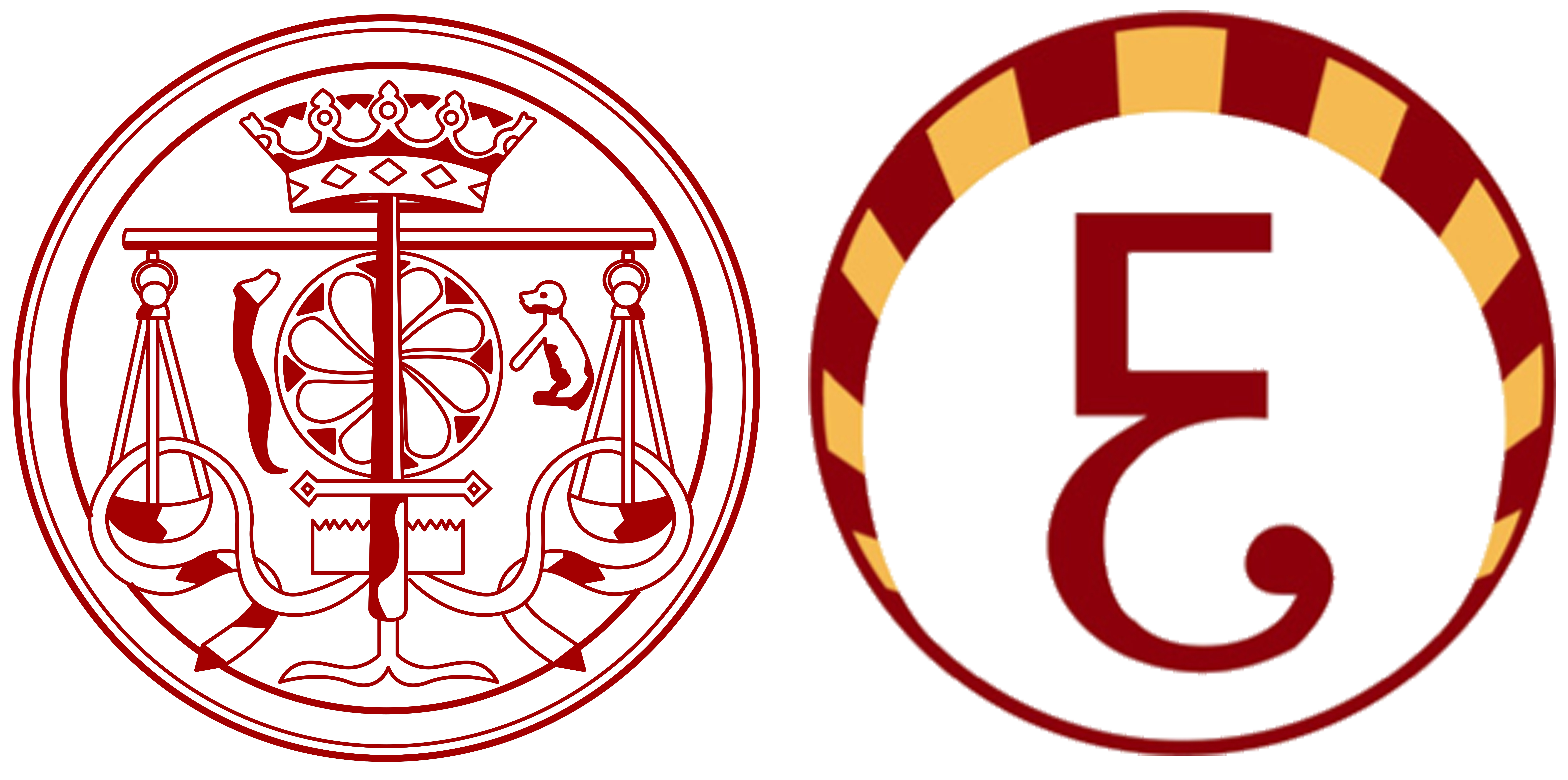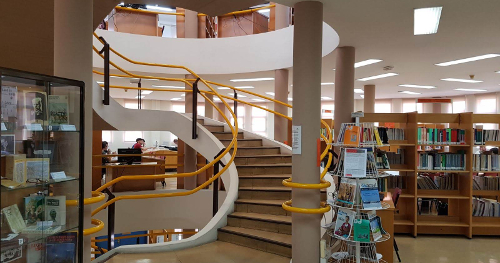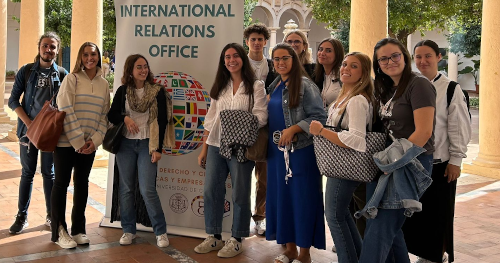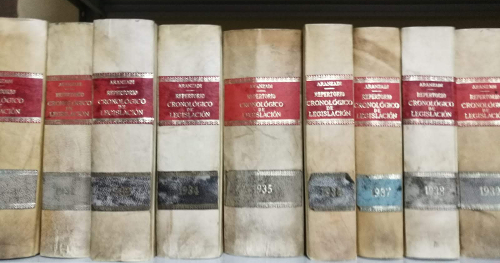Faculty of Law and Economic & Business Sciences
Plaza de Puerta Nueva, s/n. 14002 Cordoba (Spain)
Information: (+34) 957 218 846
Secretariat:(+34) 957 218 843 / 49
Office of the Dean: (+34) 957 218 841
Fax: (+34) 957 218 902
Email: This email address is being protected from spambots. You need JavaScript enabled to view it.
How to get there
The city of Cordoba is the capital of the province of the same name which, together with the other seven Andalusian provinces, makes up the Autonomous Community region of Andalusia.
The province of Cordoba covers an area of 13,723.20 square kilometres, accounting for 2.7% of the area of Spain. It has a population of over 750,000 inhabitants, the most significant population hubs being Lucena, Montilla, Cabra, Baena, Priego de Córdoba, Palma del Río, Peñarroya-Pueblonuevo, Pozoblanco and Villanueva de Cordoba.
The capital itself, Cordoba, has 300,000 inhabitants, making it the third biggest Andalusian provincial capital, behind Seville and Malaga. It sits in the Guadalquivir valley on the banks of said river, between Sierra Morena to the north and the broad plain that makes up the fertile Campiña or countryside of Cordoba to the south.
Our city’s climate can be considered Mediterranean, though it has all the characteristics of the inland continental climate, with very hot and dry summers, and cold, rainy winters.
To get to Cordoba by plane, the nearest airports are in Seville, Malaga and Madrid, cities to which Cordoba is very well connected by both rail and road.
By road, there are many options to get here, since the city of Cordoba is located in one of the most important road intersections in southern Spain.
Hence, from Madrid (400 km away), it is possible to get to Cordoba along the A-4 motorway, which takes around 4 hours.
From Seville (140 km), you can also reach Cordoba via the A-4, in approximately 1 hour 15 minutes.
From Malaga (182 Kms.), Cordoba can also be reached along the national N-331 highway, in about 2 hours.
The main bus transport companies that run from the Cordoba Bus Station are as follows:
Alsina Graells (+34) 957 27 81 00
Autotransportes López and Lisetur (+34) 957 76 70 77
Autotransportes Ureña (+34) 957 27 81 00 // (+34) 957 40 55 58
Bacoma (+34) 957 27 98 60
Empresa Ramírez (+34) 957 40 43 83
Secorbus (+34) 902 229 292
The railway lines that include Cordoba on their routes are as follows, all of which are run by the company Renfe:
High Speed Trains:
Seville–Cordoba–Madrid
Madrid–Cordoba–Seville
Malaga–Cordoba–Malaga
Other Trains:
Cordoba–Algeciras
Cordoba–Barcelona
Cordoba–Bilbao
Cordoba–Bobadilla
Cordoba–Cádiz
Cordoba–Fuengirola
Cordoba– Huelva
Cordoba–Jaen
Cordoba–Madrid
Cordoba–Malaga
Cordoba–Seville
Cordoba–Zaragoza
| BILINGUAL MODULE JOINT PROGRESSION IN BACHELOR’S DEGREE IN LAW + BCH. DEGREE IN BUSINESS ADMINISTRATION & MANAGEMENT – 2020–21 | ||||||||
|---|---|---|---|---|---|---|---|---|
| Code | Subject | Academic year | Semester | ECTS | Group enrolment | Guide 20-21 | Guide 21-22 | Guide 22-23 |
| 100117 | Financial Management | 3º | 2º | 6 | Group 27 | Guide | Guide | - |
| 142062 | European Internal Market | Optional | 2º | 4 | Group 1 | Guide | Guide | Guide |
| 100134 | Business English | Optional | 2º | 4 | Group 1 / Group 2 | Guide | Guide | Guide |
| 100136 | Ethics and Corporate Social Responsibility | Optional | 2º | 4 | Group 1 | Guide | Guide | Guide |
| 142061 | European Protection of Human Rights | Optional | 2º | 4 | Group 1 | Guide | Guide | Guide |
| 100132 | Bachelor Thesis | - | both | 6 | - | - | - | - |
Minimum level of English required of students: B1. Recommended level of English: B2.
Information
General Information
| Name of Degree | Bachelor’s Degree in Law and Bachelor’s Degree inBachelor’s Degree in Law and Bachelor’s Degree inBusiness Administration & Management |
| No. of ECTS credits/years | 412 credits / 5,5 years |
| Type of teaching involved | In-person teaching |
| Number of new admissionNumber of new admissionvacancies provided | 105 |
| Minimum number of credits forMinimum number of credits forenrolment | 24 |
| Faculty and place where taught | Faculty of Law and Economic & Business Sciences |
| Degree code |
- Law: 2501319 - BAM: 2501140 |
| Academic level | Bachelor |
| Branch | Social and Legal Sciences |
| F. Council of Ministers |
- Law: 16/07/2010 - BAM: 30/10/2009 |
| Publication in Official StatePublication in Official StateGazette (BOE) | |
| Publication of the Study Plan | |
| URL of the degree in the RUCT | |
| Academic year the degree wasAcademic year the degree wasintroduced | 2009/2010 |
| Number of academic years in theNumber of academic years in theintroduction phase | 1º, 2º, 3º y 4º |
| Languages used in teaching theLanguages used in teaching thedegree | Spanish and, in some specific subjects, French or English |
| Rules for continuance | Download |
| Name of Degree: | Bachelor’s Degree in Business Administration and Management |
| No. of ECTS credits/years: | 240 credits/ 4 years |
| Duration in years: | Four |
| Type of teaching involved: | In-person teaching |
| Number of new admission vacanciesNumber of new admission vacanciesprovided: | 149 |
| Minimum number of credits for enrolment: | 24 |
| Faculty and place where it is taught: | Faculty of Law and Economic & BusinessFaculty of Law and Economic & BusinessSciences |
| Degree code: | 2501140 |
| Academic level: | Graduate |
| Branch: | Social and Legal Sciences |
| F. Council of Ministers: | 30/10/2009 |
| Publication in Official State Gazette (BOE): | BOE 05/01/2010 |
| Publication of the Study Plan: | BOE 12/04/2010 |
| URL of the degree in the RUCT: | Link |
| Academic year the degree was introduced: | 2009/2010 |
| Number of academic years in theNumber of academic years in theintroduction phase: | 1º, 2º, 3º y 4º |
| Languages used in teaching the degree: | Spanish and, in some specific subjects,Spanish and, in some specific subjects,English |
| Rules for continuance: | Download |
| Procedure for issuing the EuropeanProcedure for issuing the Europeansupplement to the Degree: | Link |
- Justification for the Degree
- Competences
- Academic opportunities in relation to other studies
The first level, which in our case is the Bachelor’s Degree in Business Administration and Management, includes university education known as first-cycle education, whose purpose is general training that enables students to carry out activities of a professional nature. The degree’s basic education credits may be recognised in bachelor’s degrees belonging to the branch of Social and Legal Sciences, depending on the applicable regulations on recognition and transfer of credits.
The second level, Postgraduate, includes the second and third cycles. The second cycle of studies is dedicated to advanced education, of a specialist or multidisciplinary nature, with two orientations: one is an academic and professional specialisation; and the other, an initiation into research tasks. The two account for studies worth 60 to 120 credits. Passing these education blocks gives the right to obtain the title of Master’s Degree.
In the third cycle, the Doctorate studies are aimed at advanced education for the student in research techniques, including the preparation and presentation of a doctoral thesis. Access to doctoral studies requires a master’s degree to be obtained beforehand, or else more than 60 credits in official postgraduate programmes. In any case, students must have completed a minimum of 300 credits between undergraduate and postgraduate studies to enter a doctoral programme. Passing this level gives the right to obtain the title of Doctor.
Graduates will be able to access the range of Official Postgraduate Programmes of special interest depending on the knowledge and skills acquired in the Bachelor’s degree in BAM:
Master’s
- University Master’s in Business Administration and Management (MBA)
- Master’s Degree in Corporate Legal Consultancy
- Master’s Degree in Foreign Trade and Corporate Internationalisation
- Máster Universitario en Cultura de Paz, conflictos, educación y derechos humanos (interuniversitario - UCO/UGR/UCA/UMA)
- Master’s Degree in the Culture of Peace, conflicts, education and human rights (interuniversity – UCO/UGR/UCA/UMA)
- Master’s Degree in Employment. Strategies and Management of Territorial Employment Services and Policies
- University Master’s Degree in Heritage Management through the Municipality
- University Master’s Degree in Compulsory Secondary Education and Baccalaureate (Sixth-form), Vocational Training and Language Teaching
- University Master’s Degree in Supervision, Evaluation and Management of Educational Centres and Programmes
PhD Programmes
Furthermore, the university provides its own studies with their own corresponding postgraduate degree, including Master’s, Specialist and Expert programmes. One can also opt for international mobility to pursue Postgraduate Studies.
- Professional opportunities
The Bachelor’s Degree in Business Administration and Management at the University of Cordoba provides the necessary training to manage companies. Organisations combine material, human and financial resources in a highly shifting and competitive environment that requires qualified professionals. The training obtained provides graduates with the specific knowledge, skills and tools necessary to enable effective and efficient management in a company.
The broad scope of Business Administration and Management enables graduates to gain multiple facets for professional practice. Among the most significant professional opportunities are the following:
- Working in the private sector in Management and Direction of all types of companies, performing all types of functions: management, accounting, administration, purchasing, sales, finance, export, auditing in any department (Commercial, Marketing, Foreign Trade, Human Resources, Production, etc.)
- Self-employment based on creating one’s own company.
- Access to the public sector at different levels: local, regional, national and international organisations.
- Beginning a teaching career either in secondary education or at university.
In this vein, the University of Cordoba accompanies its students throughout the process and the active search for professional opportunities. The University of Cordoba’s Social Council has a network of Occupational Information and Guidance Centres (OIGC/COIE), one of which is located on the Rabanales Campus. Their purpose is to give access to information sources for university graduates, guide them in creating of a personalised itinerary to find a job, and familiarise them with the socioeconomic and production environment.
The OIGC intends to provide a Professional Guidance service that is as comprehensive as possible and fully aware of the reality of the current job market. In order to provide users with greater professional competence, aspects of complementary training and professional experience are covered via internships in companies. To achieve this aim, the office has established ties for collaboration with numerous public and private entities and organisations.
The services provided include the following:
- Information on market needs and professional opportunities (New Job Openings)
- Advice on Job Search Tools: preparing CVs, cover letters and selection interviews.
- Finding and informing about job offers.
- Dissemination of training practices in public and/or private entities.
- Job pool.
- Information on courses, public service entrance exams, scholarships, conferences, congresses, master’s degrees, etc.
- Implementation of training activities and job orientation.
- Group workshops for job searches.
- Information on other organisations in Cordoba where one may go to get more specific advice.
Within the activities to improve the employability of its graduates, the University of Cordoba deploys lines of intervention in employment guidance and in professional practices. These are centralised and coordinated through the University Foundation for the Development of the Province of Cordoba (FUNDECOR). The following lines are included: employment guidance (through the Andalucía Orienta guidance service and the employment conferences for university students), professional internships (own plan, PRAEM and EPES), intermediation in the job market (University Placement Agency and UCO Job Fair), Equality, Solidarity and Interculturality (Universem Programme and European Volunteer Service), young people’s participation in the university (Know Your University (Conoce Tu Universidad) gatherings and the UCO Alumni Association).




